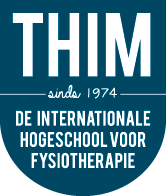For the English version see below.
Informatie Transferfase
Na module 4 van het Next begin je aan de fase waarin je je transformeert naar beginnend fysiotherapeut, de transferfase. In deze fase zijn er 4 modules die je zal moeten volgen.
Deze modules volg je in de volgende volgorde:
- Minorprogramma
- Major stage
- Wetenschappelijk portfolio en Innovatieproject
- Afstudeerstage
Bovenstaande informatie geldt voor een regulair traject. Heb je vrijstellingen of speciale wensen wat deze laatste modules betreft, neem dan contact op met de studieloopbaanbegeleider om dit te bespreken via slb@thim.nl.
Minorprogramma
THIM werkt met een major-minor structuur. Van de 240 studiepunten (EC) die je nodig hebt om af te studeren haal je er 210 met het majordeel, het vaste programma van je opleiding. Voor de resterende 30 EC volg je minoren. Als je beide delen hebt behaald, is je studie afgerond.
We bieden je mogelijkheid om je eigen minor programma samen te stellen en bieden je de verschillende onderdelen aan om de vereiste 30 EC te behalen. Zie hiervoor de informatie bij ‘Minoren 2023’ op deze site.
Major stage
De stage is de eerste kennismaking met het werkveld. Je leert hier hoe een praktijk werkt en je hebt eerste patiënt contacten. Naast dat moet je werken aan beroepsopdrachten en intervisie. Je sluit deze stage af met een PAS. Deze stage is goed voor 30 EC.
Wetenschappelijk portfolio en Innovatieproject
In deze module werk je aan de competentie: de fysiotherapeut als innovatieve professional:
“Als innovatieve professional draagt de fysiotherapeut bij aan innovatie binnen de zorg in het algemeen en binnen het vakgebied van de fysiotherapeut in het bijzonder. De fysiotherapeut signaleert, analyseert en interpreteert organisatorische, vakinhoudelijke en wetenschappelijke ontwikkelingen binnen de zorg in het algemeen, en fysiotherapie in het bijzonder, en deelt deze met collega’s. De fysiotherapeut neemt deel aan initiatieven voor vernieuwing en/of verbetering van (fysiotherapeutische) zorg.”
Deze module duurt 20 weken en bestaat uit twee delen die ieder 15 EC opleveren.
Wetenschappelijk portfolio
Binnen dit deel maak je drie opdrachten:
- CAT
- Case report: beschrijving van een complete behandeling van een patiënt
- Kwalitatief onderzoek
- Innovatieproject
Je ontwerpt een innovatie in de meest brede zin van het woord voor de zorg in de meest brede zin van betekenis. Daarna implementeer je deze innovatie bij een opdrachtgever in de praktijk.
Afstudeerstage
Na je majorstage doe je de afstudeerstage. Je weet al meer van het reilen en zeilen van de fysiotherapiepraktijk en kan je nu meer richten op je doelen om een competente beginnend fysiotherapeut te worden. Naast je patiëntencontacten werk je nu ook aan beroepsproducten en neem je deel aan intervisie. Je sluit deze stage af met een PAS. De eisen van deze PAS zullen hoger liggen dan van de PAS in de major stage. Deze stage is goed voor 30 EC.
Hieronder vind je de link naar de huidige studiehandleidingen. Let op! Het kan zijn dat er voor toekomstige cohorten dingen gewijzigd worden in de SHL.
Information Transfer Phase
After module 4 of the NEXT programme, you start the phase in which you transform into a starting physiotherapist, the ‘Transfer phase’. In this phase, there are 4 modules that you will have to follow.
You follow these modules in the following order:
- Minor programme
- Major internship
- Scientific portfolio and innovation project
- Graduation internship
The above information applies to a regular course. If you have any exemptions or special requirements regarding these final modules, please contact your study counsellor to discuss this via slb@thim.nl.
Minor programme
THIM works with a major-minor structure. Of the 240 credits (EC) you need to graduate, 210 are obtained through the major part, the fixed programme of your study programme. For the remaining 30 EC you follow minors. Once you have completed both parts, your study will be complete.
We offer you the possibility to compose your own minor programme and offer you the different parts to obtain the required 30 EC. For more information see ‘Minors 2023’ on this site.
Major internship
The internship is your first introduction to the field. You will learn how a practice works and you will have your first patient contacts. Besides that, you have to work on professional assignments and intervision. You conclude this internship with a PAS. This work placement accounts for 30 EC.
Scientific portfolio and Innovation project
In this module, you work on the competence: the physical therapist as an innovative professional:
“As an innovative professional, the physical therapist contributes to innovation in care in general and in the professional field of the physical therapist in particular. The physical therapist identifies, analyses and interprets organisational, professional and scientific developments within care in general and physical therapy in particular and shares these with colleagues. The physical therapist participates in initiatives for the renewal and/or improvement of (physiotherapeutic) care.”
This module lasts 20 weeks and consists of two parts, each of which yields 15 EC.
Scientific portfolio
Within this part, you make three assignments:
- CAT
- Case report: description of a complete treatment of a patient
- Qualitative research
- Innovation project
You design an innovation in the broadest sense of the word for healthcare. Afterwards, you implement this innovation in a client’s practice.
Graduation internship
After your major internship, you will do your graduation internship. You already know more about the ins and outs of physiotherapy practice and can now focus more on your goals of becoming a competent starting physiotherapist. Besides your patient contacts, you now work on professional products and participate in intervision. You conclude this internship with a PAS. The requirements of this PAS will be higher than those of the PAS in the major internship. This internship is good for 30EC.
Below you can find the weblink to the study manuals (SHL). Please note! These links refer to the current manuals. For future cohorts changes may take place.
